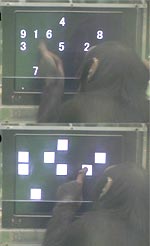- Chimpanzees make spears to hunt bushbabies
- The chimpanzee Stone Age
- Chimps use Swiss army toolkit to rob beehives
- Cultured chimps pass on new traditions between groups
- Chimpanzee collects ammo for "premeditated" tourist-stoning
- Congolese chimps modify fishing-sticks to make them even more effective tools
This article is reposted from the old Wordpress incarnation of Not Exactly Rocket Science.
 We humans aren't used to having our intelligence challenged. Among the animal kingdom, we hold no records for speed, strength or size but our vaunted mental abilities are unparalleled. But research from Kyoto University shows that some chimps have a photographic memory that puts humans to shame.
We humans aren't used to having our intelligence challenged. Among the animal kingdom, we hold no records for speed, strength or size but our vaunted mental abilities are unparalleled. But research from Kyoto University shows that some chimps have a photographic memory that puts humans to shame.
In 2007, Sana Inoue and Tetsuro Matsuzawa found that young chimps have an ability to memorise details of complex images that is literally super-human. Boffin chimp Ayumu, outperformed university students in memory tasks where they had to rapidly memorise numbers scattered on a touchscreen and press them in numerical order.
This is the first time that an animal has outmatched humans in a mental skill. Recently, I've previously blogged about animals that show abilities once considered to be uniquely human, including jays that can plan for the future, rats that know how much they know, armour-wearing octopuses, fable-confirming rooks and premeditating chimps.
But in all these cases, the animals merely showed that they could do similar types of mental feats to us. They never actually challenged our abilities in terms of complexity or scale. Simply put, a crow may be able to combine tools together, but it's never going to be able to engineer a computer.
In 2004, Inoue and Matsuzawa started to teach 3 pairs of chimp mothers and children to play with numbers. One of the mums, Ai, was the first chimp to learn to use Arabic numerals to accurately number sets of real-life objects, but the other five had never done memory tasks involving numbers. Using at touch-screen computer, the duo eventually trained all the chimps to touch combinations of numbers from 1 to 9 in the right order.
When the youngsters reached their fifth birthday, Inoue and Matsuzawa taught them a more complicated task. When they touched the first digit, the others were replaced with white squares, and they had to rely on their memory to press the right sequence. The young chimps took to this task particularly well and amazingly, they finished the task more quickly than human adults.
Ai's son, Ayumu, emerged as the class star and went on to the next challenge. He had to touch a white circle to bring up a random selection of five numbers, which were quickly replaced with white squares. Again, he had to rely on memory to press the hidden numerals in the right order.
When the numbers were flashed for two thirds of a second, Ayumu's skills were the equal of 6 university students who pressed the right sequence 80% of the time. If the numbers were displayed for just a fifth of a second, the students couldn't cope. They didn't have enough time to make a single saccade, the small eye flickers that we make when we scan a page or image. Without the luxury of exploring the screen, the students only answered accurately 40% of the time. Ayumu, on the other hand, wasn't fazed and maintained his earlier high scores.
Inoue and Matsuzawa claim that Ayumu has a photographic or "eidetic" memory that allows him to keep an accurate, detailed image of a complex scene in a very short time. His ability suggests that we should not underestimate the mental abilities of other animals, particularly our chimp cousins.
However, chimps haven't quite won the memory battle yet. Inoue and Matsuzawa note that a large proportion of human children have photographic memories but the ability fades away as they age. Ai's performance, which was worse than that of her son and the human students, suggests that chimps might experience the same decline.
If this is so, pitting a chimp in the prime of his memory like Ayumu against human teens might be an unfair contest. It would be very interesting to see if he could still out-remember human children.
Reference: INOUE, S., MATSUZAWA, T. (2007). Working memory of numerals in chimpanzees. Current Biology, 17(23), R1004-R1005. DOI: 10.1016/j.cub.2007.10.027
More on chimp intelligence:
- Log in to post comments





It sounds like the chimps have weeks or even years of training in this particular activity, so it's not really a fair comparison. Give the students a week of intensive practice sessions, and their scores would likely improve.
That said, it's still a cool story.